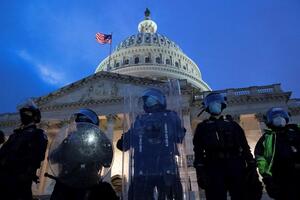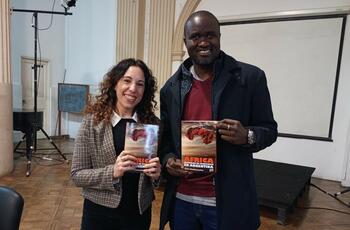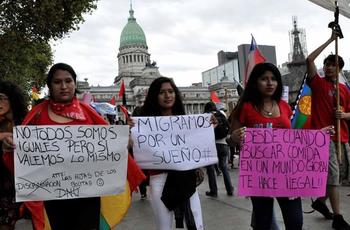Migrantes en EEUU: Indocumentados, no inhumanos
Por Courtney Commodore, desde Los Ángeles | Foto: Win McNamee
La pandemia de COVID-19 ha afectado la vida de los seres humanos en todos los rincones del mundo. Solo en los EE. UU., ha tenido más de 34.1 millones de casos y 611 mil muertes al momento de realizar esta nota. Algo común que ha revelado la pandemia son todas las debilidades que aún existen en nuestros sistemas de gobernanza, así como en el cuidado de la salud. En los Estados Unidos, los inmigrantes siempre han sido la columna vertebral de nuestra sociedad, sin embargo, con las nuevas enmiendas a las leyes de inmigración que realizó el presidente anterior, Donald Trump, se está volviendo más difícil que nunca sobrevivir como inmigrante indocumentado ante esta situación mundial.
Vivir con miedo al ICE
En general los indocumentados logran alcanzar la ciudadanía a través de un empleo, reunificación familiar o protección humanitaria (American Immigration Council). Un problema grande es que muchos de los inmigrantes no pueden recibir protección humanitaria o el título de refugiado aunque su propio país es peligroso, y por eso, ellos viven sin ciudadanía. En ese caso, pueden ser deportados por el ICE (Servicio de Inmigración y Control de Aduanas de EE. UU.), pero prefieren vivir, aún bajo las amenazas de esta policía de inmigrantes, que regresar.
Los inmigrantes indocumentados representan alrededor de 11 millones de personas en los Estados Unidos, y sólo en Los Ángeles 800,000 están en esa condición de los casi 2 millones de inmigrantes en total. Dentro de esa población, alrededor del 80% de los trabajadores tiene trabajos esenciales, y muchos no tienen acceso a asistencia médica o seguro, como resultado de la falta de documentación, que brinden asistencia a la población indocumentada que desempeña un papel crucial.
Afortunadamente, en estados como California, hay varias organizaciones sin fines de lucro que brindan apoyo financiero a inmigrantes indocumentados que trabajan en restaurantes, entrega a domicilio, transporte basado en aplicaciones y otros para ayudar a pagar la comida y el alquiler. Sin embargo, este no es el estándar en todos los estados, y a muchos inmigrantes indocumentados se les niega el acceso a fondos de ayuda federal, debido a la falta de documentos, así que si pierden su trabajo o dan positivo en la prueba de COVID, a menudo se quedan sin nada, incluso en las principales ciudades como Baltimore, Maryland, que prometen albergar a los pacientes con COVID positivo en hoteles durante dos semanas, muchos inmigrantes indocumentados no confían en que, después de años de las políticas y retórica anti inmigración de Trump, el gobierno actual de Biden los ayudaría. Esto se debe al temor de confiar en las instituciones estadounidenses, como los hospitales y los centros de pruebas, para que no llamen al ICE y los obliguen a perder todo, incluso a sus familias. "Tenemos miedo de hacernos la prueba. Seremos deportados”, asegura un indocumentado en Los Ángeles.
El COVID en los Centros de Detención ICE
Se ha informado que los centros de detención de ICE durante toda la pandemia tienen condiciones que no estaban a la altura de los protocolos COVID, lo que pone en peligro aún más las vidas de inmigrantes indocumentados, que a menudo fueron silenciados y no reconocidos.
“Para lavarse las manos, sólo hay una toalla de tela compartida que es repugnante. Hay un par de barras de jabón para que la gente las comparta, pero es asqueroso y la gente no quiere tocarlas", denuncian desde la Mesa Verde.
Los centros de detención de ICE tardaron en proporcionar tests de COVID-19 y exigir políticas para garantizar que todos usaran máscaras, a menudo castigando a las personas indocumentadas haciéndolas permanecer en confinamiento solitario si pedían máscaras, desinfectante de manos o si cuestionaban al personal por la falta de protocolos.
En la actualidad, el ICE ha reportado 16,182 casos de COVID en todos los centros de detención. (ICE website) Pero este número puede ser falso porque no testearon a los indocumentados por muchos meses durante los primeros tiempos de la pandemia.
¿Qué sigue?
Si bien, la Cuarta Enmienda de la Constitución estadounidense no obliga a los centros de salud a denunciar a los inmigrantes indocumentados, y las personas que necesiten deberían ir a buscar atención médica, vacunas o pruebas de COVID, ellos evitan hacerlo por temor a ser deportados como el año pasado. Durante el gobierno de Trump fueron numerosos los casos de niños que perdieron a sus padres por no tener ciudadanía.
Las instalaciones de pruebas y vacunas pueden requerir mostrar identificación, pero esa identificación puede ser de cualquier forma, incluso una licencia vencida de un país exterior porque el propósito de identificar a las personas es únicamente para fines de mantenimiento de registros en caso de que los proveedores de atención médica necesiten brindar atención adicional. El problema ahora es generar confianza entre los inmigrantes indocumentados y los proveedores de atención médica para que las personas reciban la atención que necesitan sin temor a ser deportados.
Por otro lado, el ICE no está reportando si está realizando la vacunación en los centros a sus detenidos, por lo que sus instalaciones deben seguir siendo investigadas y colocadas bajo vigilancia externa para garantizar que los derechos humanos de los detenidos están siendo protegidos y respetados.
In English:
Migrants in the US: Undocumented, not inhuman
Journalist Courtney Commodore describes from Los Angeles the situation of millions of undocumented people who have seen social inequities deepen as a result of the pandemic. From more complex medical care, to simple elements of personal hygiene make basic care against the coronavirus more difficult.
By Courtney Commodore, from Los Angeles | Photo: Win McNamee
The COVID-19 pandemic has affected the lives of people in every corner of the world. In the US alone, there have been more than 34.1 million cases and 611,000 deaths as of this publication. Something common that the pandemic has revealed are all the weaknesses that still exist in our governance systems, especially in healthcare. In the United States, immigrants have always been the backbone of our society, however, with the new amendments to immigration laws made by the previous president, Donald Trump, it is becoming more difficult than ever to survive as an undocumented immigrant in the face of this global threat.
Living in fear of ICE
In general, undocumented immigrants achieve citizenship through employment, family reunification or humanitarian protection (American Immigration Council). A big problem is that many of the immigrants cannot receive humanitarian protection or the title of refugee regardless of the danger that exists in their country, so they choose to continue to live in the US without citizenship with the threat of deportation by ICE (US Immigration and Customs Enforcement). But they would rather live under the threats of immigrant police, than to return.
Undocumented immigrants represent about 11 million people in the United States, and in Los Angeles alone 800,000 out of the nearly 2 million immigrants total. Within that population, around 80% of workers have essential jobs, and many do not have access to medical assistance or insurance, as a result of the lack of a social security number, removing the potential to receive government assistance.
Fortunately, in states like California, there are several non-profit organizations that provide financial support to undocumented immigrants who work in restaurants, home delivery, and app-based transportation, to help pay for food and rent. However, this is not the standard in all states, and many undocumented immigrants are denied access to federal aid funds due to lack of documentation, so if they lose their job or test positive for COVID, they are often left with nothing. Even in major cities like Baltimore, Maryland, which promise to house COVID-positive patients in hotels for two weeks, many undocumented immigrants don't trust that after years of anti-immigration policies and rhetoric from Trump, the current Biden government would help them. This is due to the lack of trust in American institutions, such as hospitals and testing centers, not to call ICE and force them to lose everything, including their families. "We are afraid of taking the test. We will be deported," says an undocumented person in Los Angeles.
COVID in ICE Detention Centers
ICE detention centers throughout the pandemic have been reported to have conditions that did not live up to COVID protocols, further endangering the lives of undocumented immigrants, who were often silenced and unrecognized.
“To wash your hands, there is only one shared cloth towel which is disgusting. There are a couple of bars of soap for people to share, but it is disgusting and people do not want to touch them, " they reported from the Mesa Verde detention center.
ICE detention centers were slow to provide COVID-19 tests and require policies to ensure that everyone wears masks, often punishing undocumented people by placing them in solitary confinement if they asked for masks, hand sanitizer, or questioned staff about the lack of protocols.
Currently, ICE has reported 16,182 COVID cases in all detention centers. (ICE website) But this number may be false because the undocumented were not tested for many months during the early days of the pandemic.
What's Next?
While the Fourth Amendment of the U.S. Constitution does not require health facilities to report undocumented immigrants, and those who need it should go to seek medical care, vaccinations, or COVID tests, they avoid doing so for fear of deportation. Last year, during the Trump administration, there were numerous cases of children who were separated from their parents due to not having citizenship.
Vaccine and testing facilities may be required to show identification, but that identification can be in any form, even an expired license from a foreign country because the purpose of identifying individuals is solely for record-keeping purposes so that health care providers could offer additional services. The problem now is building trust between undocumented immigrants and healthcare providers so that people receive the care they need without fear of deportation.
On the other hand, ICE is not reporting whether it is carrying out vaccinations in their detention centers, so its facilities must continue to be investigated and placed under external surveillance to guarantee that the human rights of detainees are being protected and respected.















